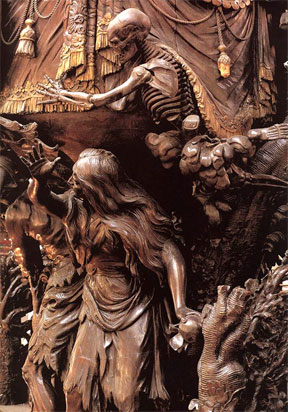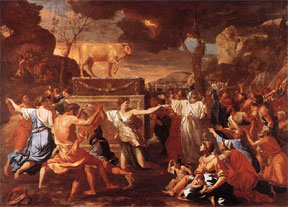| |
A Resource by Mark D. Roberts |
|
The Lure of the Dark Side:
Star Wars and the Bible
by Rev. Dr. Mark D. Roberts
Copyright © 2005 by Mark D. Roberts
Note: You may download this resource at no cost, for personal use or for use in a Christian ministry, as long as you are not publishing it for sale. All I ask is that you give credit where credit is due. For all other uses, please contact me at mark@markdroberts.com . Thank you.
Star Wars, Episode III: A Brief Review 
Posted for Friday, May 20, 20005
I saw the latest Star Wars film tonight. If you haven't seen it yet, don't worry, nothing in this column will spoil the movie's surprises.
I enjoyed the film quite a bit. The special effects are astounding. George Lucas has managed to create, not a magical world, but many of them. The creatures and machines that fill these worlds are equally amazing. My only fear is that if, in the future, people watch the six Star Wars films in narrative sequence, the visual shift from Episode III to Episode IV (now 28 years old) will be like moving your eyes from the Mona Lisa painting to a cartoon drawing of Lisa Simpson.
Many critics have pointed out the weakness in the dialogue of Episode III. There were only a few times when the lines were so bad as to make me realize it. Sadly, some of these scenes had the greatest potential to draw me emotionally into the film. But their woodenness limited my emotional engagement to some extent.
Nevertheless, I was engaged by the story, most of all the story of how an overly ambitious but basically good Anakin Skywalker becomes the truly evil Darth Vader. I knew Lucas had to throw in some creative plot twists here, and this he did, to my satisfaction. (I won't supply details because I don't want to ruin the surprise.) |
|
Everybody says this is a dark film, the darkest of the Star Wars films by far. There's no question about this. It's also the most graphically disturbing film of the sequence, deserving of its PG-13 rating.
| Warning to parents: Episode III does indeed include several very intense scenes that are not appropriate for younger children. This is too bad, in a way, because it means that children under ten, maybe under twelve, shouldn't see the whole Star Wars sequence. But it wouldn't have made much sense for this movie to be lighthearted. It could have been a bit less grisly, however, if getting a PG rating had been a high priority. |
Although the film foreshadows what is to come, and thus we get a tiny taste of "the new hope" of Episode IV, I left the film feeling rather melancholy. The transformation of Anakin Skywalker is sad, as is the impact of his change on many characters. I'm certainly glad we don't have to wait years for the next chapter in the story to come out.
In my next post I want to philosophize a bit about what Star Wars teaches us concerning the power of "the dark side." I think there's a good lesson here, perhaps several.
The Force and the Holy Spirit 
Part 2 of the series: "The Lure of the Dark Side"
Posted for Saturday, May 21, 2005
Yesterday I posted my brief review of Star Wars, Episode III: The Revenge of the Sith. Today I want to reflect a bit further on the truth illustrated in this movie.
Episode III is rather like Titanic and The Passion of the Christ in that virtually everyone knows the main story line even before seeing the film: the Titanic will hit an iceberg and sink; Jesus will be killed; Anakin Skywalker will become Darth Vader. The big question going in is: So exactly what turns Anakin from an ambitious Jedi Knight to the evil Darth Vader, enemy of the Jedi?
I'm not going to give details that will spoil the movie. But I can talk about what's in the film without ruining the surprises. In particular, I want to reflect on what causes one to turn from the light side of the Force to the dark side. I believe that, if we're not careful, we can tread down the same path that led Anakin to his doom.
If you've seen any of the Star Wars films, you're familiar with the Force, a powerful life-force that fills the cosmos. The Force is neither good nor bad, but has both good and bad sides. Thus it's somewhat like magic in Harry Potter or nuclear energy in the real world. These are powers that have the potential to do both great good and great harm depending on the moral state of the practitioner.
From a Christian perspective, the Force bears only a vague resemblance to the Holy Spirit. Both can empower people to do things far beyond their ordinary abilities. But here the similarities end. The Force is an inanimate entity that permeates all creation. The Holy Spirit is a person of the triune God, and thus is essentially transcendent of creation. |
|
| |
In the Star Wars saga we first learn about the Force from Obi Wan Kenobi (in Episode IV). In Episodes I-III Ewan McGregor plays this role; it's played by Alec Guinness in Episodes IV-VI. |
This is one reason, by the way, that Christians refer to the Spirit as "He" rather than "It," even though the Spirit is not male. (Curiously enough, the Hebrew word for "Spirit" is ruach, which is feminine. If we were speaking biblical Hebrew today, we'd refer to the Spirit as "she.") The use of a personal pronoun doesn't signify the gender of the Spirit. Instead, it reminds us that the Spirit isn't a thing or an inanimate force, but rather a living, willful personality.
The Holy Spirit has a personality and a will. God's Spirit does not have a dark side. The Spirit is good, and only good. Orthodox Christians believe that there are evil powers in this world, but they're distinct from God. Satan and demons fill the biblical world, and though they originate from the one God, they are separate from the good Creator.
I realize that what I'm saying is obvious to many of my readers. But I have sometimes heard people talk about the Holy Spirit as if "it" were a "force" to be "used" by Christians. This sounds more like Star Wars than biblical Christianity. We'd be much better off thinking of God's Spirit as an almighty being who chooses to use us sometimes rather than the other way around. Even spiritual gifts are not something we can control at will. Just ask someone who is praying for the sick. We can't make the Holy Spirit do what the Spirit hasn't chosen to do. God's Spirit is truly sovereign.
So when I talk about the lure of "the dark side," I do not mean "the dark side of the Spirit," because there is no such thing. Rather, I'm thinking about how people who are empowered by the Holy Spirit and walk in God's ways can be drawn to turn away from God and put their trust in human and/or demonic powers.
In my next post I'm going to pursue this issue further.
The Temptation of Jesus and the Lure of Shortcuts 
Part 3 of the series: "The Lure of the Dark Side"
Posted for Sunday, May 22, 2005
In the Star Wars saga there are good guys, the Jedi and their allies, and the bad guys, the Sith and their allies. Ironically, both the Jedi and the Sith draw inspiration from the same source, the immaterial, immanent Force. So when the Jedi bless each other with "May the Force be with you," it's really a qualified greeting, "May the Force be with you, just so long as it's not the dark side."
The Jedi knight is not immune from the dark side of the Force. Not only is the Jedi at risk of being killed by a Sith lord, but also of being seduced by the dark side of the Force. This latter threat is particularly acute for younger Jedi, young men like Anakin Skywalker and Luke Skywalker.
Mature Jedi masters, folks like Obi Wan Kenobi and Yoda, continually warn their younger colleagues about the danger of the dark side of the Force, especially the danger of being seduced by its power. What can turn a Jedi from the light side to the dark side of the Force? It's largely a matter of negative feelings: anger, hatred, jealousy, fear, and a passion for power. If a Jedi indulges these feelings too regularly, he or she might be sucked into the dark side.
Though the situation of a Christian isn't exactly the same as that of a Jedi, there are many similarities. We who serve God by God's own power are often tempted to abandon God's ways and replace them with the ways of this world. Behind these, of course, we find the one Jesus refers to as "the ruler of this world" (e.g. John 12:31), none other than Satan himself.
| In one of the classic stories from the New Testament gospels, Jesus was tempted by what we might call "the dark side." After his baptism he went into the wilderness for forty days in order to fast and pray. There he was tempted by the devil. The first temptation was to use his miraculous power for personal gain, specifically to satisfy his physical hunger. The second temptation was glory and power. If only Jesus would worship Satan, then Jesus would be glorified by humankind (rather than spat upon and crucified). The third temptation was to test God so that Jesus might prove his identity as the Son of God. Yet in each case, Jesus spurned the temptation. He refused to compromise his calling, or to choose the easy path of glory and gain. |
|
| |
A detail from Sandro Botticelli's "Temptation of Christ and Purification of the Leper" in the Sistine Chapel (c. 1481). |
What is striking about the three temptations is that what Satan offered was, in a sense, only good and laudable things. In reference to the first temptation, we recognize that food is a good thing. God feeds us, supplying daily bread as a part of his gracious provision. Jesus Himself, later in His ministry, miraculously multiplies bread in order to feed the multitudes. With regard to temptation number two, we acknowledge that it would be wonderful for Jesus to have all glory and authority. In fact, someday He will receive these very things. And with respect to the third temptation, it is surely true that one day Jesus will be recognized by all creation as the Son of God. So the things the devil offered Jesus weren't wrong in and of themselves (like murdering innocent people, for example). In fact, they were good things, things Jesus was right to desire. The problem wasn't the ends, but the means.
Satan offered Jesus apparent shortcuts to what He would one day receive: satisfaction, glory, authority, fame. Jesus, however, choose what seemed to be the long way around, the way of sacrifice, suffering, humility, servanthood, and anonymity. He gave up easy glory for the sake of eternal glory.
As a Christian, and especially as a Christian leader, I have felt similar temptations, though to my knowledge I've never had a direct encounter with Satan (thank God!). Let me offer one example. Twenty years ago I was serving as the Director of College Ministries at the First Presbyterian Church of Hollywood. I enjoyed my work, though the group was fairly small and not altogether responsive to my leadership. I was making somewhere around $22,000 a year, which wasn't a bad salary in 1985, but wasn't anything to brag about. Nevertheless, I felt quite sure that I was where God wanted me to be.
Then, out of the blue, I had a private meeting with a prominent Christian leader. He wanted me to join his ministry. The position he offered would mean lots of public recognition, rather a fast track to glory. Plus he offered to double my current salary. In many ways it looked like a fantastic opportunity. There was only one small problem: my conviction that God wanted me to be the College Director at Hollywood Pres. Yet I was tempted, very tempted, to "serve the Lord in this exciting new area." As I talked it over with my wife, and as I prayed about it, I became convinced that what was being offered to me, though surely a good thing for somebody, was wrong for me. So in obedience to God, but with lots of ambivalence, I turned down the offer.
Looking backwards, there is no doubt in my mind that I did the right thing. What I faced was either a temptation (from Satan) or testing (from God) or something in middle (whatever that might be). By God's grace I was able to reject the lure of fame and fortune, and I'm glad I did. Yet that experience helped me to realize how vulnerable I am to taking short cuts, to putting my personal ambition above serving the Lord.
What if I had chosen the wrong path? Who knows? I'm pretty sure I wouldn't have become a Sith lord. But I expect I would have encountered some unhappy twists and turns in the path of my life as God graciously worked to get me back on track.
In my next post I want to reflect a bit further on some of what might lure Christians to "the dark side."
The First Turning to the Dark Side 
Part 4 of the series: "The Lure of the Dark Side: Star Wars and the Bible
Posted for Monday, May 23, 2005
In this series I've been wondering about how godly people can be tempted to turn to the "dark side," that is, to abandon God's ways for the ways this world and it's diabolical prince. My last post focused on the temptation of Jesus who, thankfully, did not take the shortcuts offered by the devil, but remained faithful to the ways of God.
If we think about biblical characters who have "turned to the dark side," Adam and Eve quickly come to mind. They are the archetypal "turners," who went from sinlessness to sinfulness in one fell swoop, falling prey to the temptation of the serpent. Here's the story as it appears in Genesis 3:1-7 (NLT):
Now the serpent was the shrewdest of all the creatures the LORD God had made. “Really?” he asked the woman. “Did God really say you must not eat any of the fruit in the garden?”
“Of course we may eat it,” the woman told him. “It’s only the fruit from the tree at the center of the garden that we are not allowed to eat. God says we must not eat it or even touch it, or we will die.”
“You won’t die!” the serpent hissed. “God knows that your eyes will be opened when you eat it. You will become just like God, knowing everything, both good and evil.”
The woman was convinced. The fruit looked so fresh and delicious, and it would make her so wise! So she ate some of the fruit. She also gave some to her husband, who was with her. Then he ate it, too. At that moment, their eyes were opened, and they suddenly felt shame at their nakedness.
What was it that lured the first humans to reject God in favor of "the dark side"? It was the promise of being like God, especially with respect to knowing all things. God had determined that certain kinds of knowledge should be withheld from human beings and reserved for God alone. But the first humans weren't satisfied with this restriction. They wanted to be like God in what they knew, and so chose to disobey God, with drastic consequences both for themselves and for the rest of humanity.
I find it fascinating that what lured Adam and Eve into sin was a desire which, in many respects, is laudable. They wanted, after all, to be like God. Often this is a good thing. We're told in Ephesians 5:1, for example, that we're to be "imitators of God, as beloved children." Yet this verse does not give us the license to imitate God in every way, but in our love, self-sacrifice, and propensity to forgive. We are not to be like God in other ways. We are not, for example, to make up ten commandments for all human beings to follow. We are not to pretend as if we have ultimate divine authority. And, when it comes to knowledge, we must not think that we know absolutely or perfectly. Our knowledge, even when it comes by way from God's revelation, is at best partial and somewhat blurred (1 Corinthians 13:12).
Sometimes we forget that our knowledge is limited. I have seen good Christian people, even fine Christian leaders, flirt with the "dark side" when it comes to their estimation of their own knowledge. People who seek after God's truth sometimes end up believing that their perception of the truth is completely right. They seem utterly unwilling to admit even the possibility that they have somehow gotten things wrong. They claim to know with a certainty that rightly belongs to God alone. |
|
| |
This carving represents Adam and Eve being kicked out of the Garden of Eden. It is part of an exceptional pulpit carving by Hendrick Frans Verbruggen, a Flemish artist who carved this piece c. 1695. The pulpit is in the Cathedral of St. Gudule in Brussels. |
| |
 |
Some years ago I was in the midst of a heated debate with another Christian leader. It had to do with our understanding of the nature of the church. He believed that his view was 100% correct, and that mine was mostly wrong. I was rather fond of my own view, naturally. Yet as our debate morphed into an argument, I became increasingly uncomfortable with the other man's apparent arrogance. At one point I interrupted the flow of thought and asked him, "So, do you think it's at least possible that you're wrong about some of this?" He stopped dead in his tracks and said nothing for a long time. I had a pretty good idea what was going on in his head. He was a good enough theologian to know that his answer had to be "Yes, I could be wrong," but he found it extremely difficult to actually admit this to himself, let alone to me. His knowledge, and his confidence in his ability to know perfectly, had become an idol, a "dark side" replacement for humility before the one true God. Finally the leader said to me, "Yes, I guess I could be wrong." "Me, too," I quickly added. "In fact, I'm pretty sure that some of what I've been saying today is wrong. What we're talking about is very complex, and I sense the limitations of my human, fallible understanding." He admitted the same, and so we began a very different kind of dialogue, one in which we were searching together for God's truth rather than assuming that we ourselves had cornered the market of what God alone possesses.
I'm not suggesting, by the way, that over-confidence in one's personal opinions is exactly what "knowledge of good and evil" is all about in Genesis 3. But I do believe that when we who deeply value truth cannot recognize our own limitations in knowing that truth, when we regard ourselves as inerrant purveyors of divine truth, then we run the risk of being snagged by "the dark side" of arrogance and idolatry. I'm not for one minute suggesting that we should all become relativists, mind you. We must continue to seek after God's unique, absolute truth. But we must also recognize that we will never perceive absolute truth with absolute accuracy this side of heaven. Thus we take the truth seriously without taking ourselves too seriously. We affirm God's truth passionately, but always with humility. In this way we keep away from the "dark side" that twists divine truth for human and even diabolical purposes.
Cain and the Power of Anger 
Part 5 of the series: "The Lure of the Dark Side: Star Wars and the Bible
Posted for Tuesday, May 24, 2005
In my last post I examined the first instance in Scripture of turning to "the dark side." Adam and Eve, in their desire to be like God, disobeyed God's command. The results of this dire decision were both several and severe, including:
• shattered intimacy between the man and the woman;
• brokenness in the relationship between God and humanity;
• painful childbearing for the woman;
• laborious fruitfulness for the man;
• physical and spiritual death;
• exclusion from Paradise.
Nevertheless, God did not reject the first humans completely. Though they had turned against Him, God mercifully clothed them (Gen 3:21) and even blessed them with children, Cain and Abel (Gen 4:1-2).
Yet the pattern begun by the parents was reproduced in the lives of their children. Both Cain and Abel brought offerings to God. Yet for reasons not explained in Genesis, God accepted Abel's offering but rejected Cain's. As a result, "Cain was very angry, and his face was downcast" (Gen 4:5, NIV). The Lord sought out Cain, asking, "Why are you angry? Why is your face downcast? If you do what is right, will you not be accepted? But if you do not do what is right, sin is crouching at your door; it desires to have you, but you must master it" (4:6-7). Cain responded to God's warning by taking his brother out into the field and killing him. When the Lord once against sought out Cain to ask the whereabouts of Abel, Cain replied deceptively, "I do not know [where my brother is]. Am I my brother's keeper?" (4:9). Of course God knew what had happened to Abel, and so banished Cain and sentenced him to be a fugitive and wanderer for the rest of his life (4:12).
Why did Cain turn to "the dark side"? The text mentions his anger, noting that it was extreme (4:5). Yet notice that God didn't condemn Cain simply for being angry. Anger surely contributed to Cain's murder of his brother. But God was clear that Cain had the potential to "master" his anger. Here the language is rather close to what we find in Star Wars. Time and again throughout the film saga a young Jedi begins to act in anger, often goaded on by a Sith lord. And, repeatedly, the Jedi masters warn their apprentices not to succumb to their anger, but to master it.
Anger doesn't necessarily drive one to oppose God in favor of "the dark side." Sometimes, in fact, God becomes angry over human sin (e.g. Num 11:33). So feeling angry isn't necessarily bad, though it can drive us to sin, thus luring us to "the dark side." Cain's anger may well have come from his prideful character, but his real sin was chosing to give in to anger and murder his brother.
| I can certainly relate to Cain, at least to some extent. I've never killed my brother, but there were times when we were younger when I gave in to my anger and treated him poorly. My brother Gary is three years younger than I am. When he was around five years old, he could have been the poster child for "TV makes kids violent" crusade. I remember once when we were watching The Three Stooges on television. Moe became peeved with Curly and appeared to take two fingers and jab them into Curly's eyes. Gary thought this looked like fun, so he did to me what he had just observed, poking his fingers right into my eyes. I cried out in pain and then in anger pummeled Gary. Though I would never have hurt him when I was in my right mind, surging rage silenced my conscience. |
|
| |
I'm glad my brother missed this scene.
|
Later, while enjoying an hour-long time out to think about what I had done, I felt genuine remorse. I knew Gary didn't mean to hurt me. He was just playing. Yet in anger I had succumbed to "the dark side" for long enough to add a couple of bruises to his young body. (Ironically, Gary is now one of the gentlest people I know, except when duty demands otherwise. He's a deputy sheriff in the Los Angeles County Sheriff's Department, and has, by the way, probably twice as much muscle mass on his upper body as I do. I'm glad he outgrew his Three Stooges behavior.)
As an adult, I don't get angry very often. Most of the time I'm pretty mellow. But there have been times when I have been furious and acted in ways that were inappropriate, to say the least. Well, okay, they were flat out sinful. Sin was crouching at my door, so I opened it wide and welcomed sin in for a nice visit. That's the bad news. The good news is that both God and those I've wronged in anger have been forgiving.
But I have watched some people, even Christian leaders, who seem to have given in to persistent anger. This can happen with Christians who are on the front lines of certain passionate social or ecclesiastical battles. They begin with what might be called righteous anger over some sort of injustice. But rather than moving on emotionally, they stew in this anger until it taints their lives. Thus, even in their efforts to honor God, their anger-driven behavior dishonors God. They end up demonizing their opponents, hating them in addition to their behaviors. Unrestrained anger consumes the remnant of Christ's love in their hearts.
Again, I'm not saying that anger itself is necessarily wrong. When faced with injustice, anger is often a right response. Yet if anger becomes a prime motivator of our lives, then we can easily lose sight of God and God's ways in the world. We can end up caught in "the dark side" of life, acting more out of rage than love or godly conviction. Like Cain, we too can end up going "away from the presence of the LORD" (Gen 4:16).
If you're feeling anger about something, even if this something is a matter of genuine injustice, be careful. A Jedi master would warn you that anger leads to "the dark side." God would say that "sin is crouching at your door." Whether you’re a parent dealing with a recalcitrant teenager, or a pastor confronting a pesky parishioner, or a church member responding to poor decisions by your church's leadership, remember that anger can easily blur your vision, compromise your comprehension, and lead you to behave in ways dishonoring to God.
The Power of Fear 
Part 6 of the series: "The Lure of the Dark Side: Star Wars and the Bible
Posted for Wednesday, May 25, 2005
So far in this series I've examined the stories of people who have turned to "the dark side," rejecting God's ways in favor of worldly and diabolical ones. Today we'll look at one of the classic "turning to the dark side" stories in the Bible.
The story comes in Exodus 32. The context is the exodus of Israel from Egypt. God had miraculously delivered His people from slavery, leading them forward with His presence (Exod 13:21-22), and entering into a special covenant relationship with them. If the Israelites would keep God's covenant, they would be greatly blessed as His special people. The core of the covenant was what we call "The Ten Commandments." The first two of these commandments were:
I am the LORD your God, who brought you out of the land of Egypt, out of the house of slavery; you shall have no other gods before me.
You shall not make for yourself an idol, whether in the form of anything that is in heaven above, or that is on the earth beneath, or that is in the water under the earth. You shall not bow down to them or worship them; for I the LORD your God am a jealous God, punishing children for the iniquity of parents, to the third and the fourth generation of those who reject me, but showing steadfast love to the thousandth generation of those who love me and keep my commandments. (Exod 20:2-6)
As Israel waited at the foot of Mt. Sinai, Moses went up on the mountain to receive God's full guidance for His people. But when Moses didn't return, the people panicked. Had he died? Had he abandoned them? The Israelites seemed to forget that God had delivered them from Egypt, not Moses. Yet an invisible God is sometimes harder to trust than something visible. So the Israelites asked Aaron, Moses's brother and the leader in Moses's absence, to "make gods" for them. Aaron heeded their request, asking the Israelites to donate their golden jewelry, which he fashioned into a golden calf. Then the people said to each other, "These are your gods, O Israel, who brought you up out of the land of Egypt!" Following this announcement, Aaron built an altar before the golden idol and declared a holiday for worship and celebration. The people offered sacrifices and celebrated wildly, in the ways of ancient paganism.
Both Moses and the Lord were furious with the Israelites. When Moses descended from the mountain, he destroyed the golden calf and made the people consume it as a powdered drink (really! See Exod 32:20). Then he gathered the people who were faithful to God and commanded them to kill those who had worshiped the golden calf. Talk about church discipline!
The next day Moses went before the Lord to intercede for the Israelites, asking that God forgive them. He granted Moses's request, though adding that there would be punishment for the people, which turned out to be a plague of some sort. |
|
| |
"The Adoration of the Golden Calf" by Nicolas Poussin, c. 1634. |
Finally the Lord sent the Israelites on their way to the Promised Land, choosing not to destroy them for their idolatry. But He refused to be present among them, sending an angel in place of His own holy presence. This deeply grieved the people, who from them on refused to wear jewelry as they walked to the Promised Land.
This story illustrates how serious it can be to turn to “the dark side,” even for a short while. As a result of Aaron’s and Israel’s sin, the people suffered with a plague. But even more distressing was God’s removal of his holy presence from Israel. Though they would be led through the wilderness by an angel, God Himself no longer dwelt in their midst.
Why did the people turn to “the dark side” of idolatry? For one thing, it was the natural, commonsensical thing to do. Throughout the ancient world, and surely in Egypt from which the Israelites had come, people worshiped the gods through using idols that represented the gods’ reality. These idols made the gods seem tangible and real. Israel, however, had entered into a covenant relationship with an invisible God, a God made known only through words and actions. When doubting the faithfulness of the Lord, it was only natural for Israel to want an idol.
Yet beneath this natural dependence of a visible idol was Israel’s fear. When Moses didn’t return from the mountain in what the Israelites considered a reasonable amount of time, they panicked. Perhaps Moses had left them, or been killed. Perhaps they were now alone in the wilderness without help or hope. Fear motivated the Israelites to want an idol, something they could see, something that would comfort them in their fears.
Of course the problem was that God had specifically stated that Israel was not to make idols of any kind to represent Him. This was, after all, the second commandment. So by making and worshiping a golden calf, even if this calf was meant to represent the Lord, the Israelites were dishonor Him and breaking His covenant.
Perhaps one of the most distressing aspects of this story – especially for a religious leader – is Aaron’s role. When the people came to him and asked him to make “gods” for them, Aaron consented. He was the one who collected the gold and fashioned the calf. He called Israel to worship before the golden calf.
Why did Aaron do this? Why didn't he stand up to the people and deny their request? Exodus 32 doesn't give us much insight into Aaron's motivation, but I expect that fear played a major part. Not only might Aaron have shared Israel's fear that Moses was gone for God, but also he probably feared what the people might have done to him if he rejected their request. Explaining himself to Moses in verse 22, Aaron said, "You know the people, that they are bent on evil." I imagine that he thought this evil inclination would be pointed in his direction if he refused to make an idol for the people.
In the Star Wars saga, fear can push a Jedi in the direction of "the dark side" of the Force. In Exodus 32, fear led the Israelites to cry out for an idol, and fear led Aaron to heed their request. Fear and "the dark side" go hand in hand. When I'm afraid, and especially when I'm afraid that God won't help me out, I'm inclined to put my trust in other things. I've never fashioned a golden calf, but I have created "idols" that take God's rightful place in my life. I offer my first loyalty to things like planning, organization, intellectual understanding, and effective communication. None of these are necessarily bad, of course. But they are wrong when I put more faith in them than in God.
The Sorry Downfall of King Saul, Section A 
Part 7 of the series: "The Lure of the Dark Side: Star Wars and the Bible
Posted for Thursday, May 26, 2005
Perhaps no biblical character is more like Anakin Skywalker than Saul, son of Kish, the first king of Israel. Like Anakin, Saul began life humbly, son of a common man in the smallest of the tribes of Israel (1 Sam 9:21). Yet, like Anakin, Saul possessed impressive personal gifts, including handsome appearance and impressive height. Both were born leaders in spite of their humble station. For this reason both were chosen, Anakin by the Force, Saul by the Lord, to be leaders of the "good guys" in the battle against evil.
Both Anakin and Saul started their public careers auspiciously. Anakin was "adopted" by the Jedi master Qui-Gon Gin and his apprentice, Obi-Wan Kenobi. Saul was anointed by the prophet Samuel as the king of Israel, and then filled with the Spirit of God (1 Sam 10:1-13). Anakin, facing almost insurmountable odds, won the pod race in Episode I. Saul saved Jabesh Gilead from Nahash the Ammonite (1 Sam 11:1-15).
Yet both men began their slide to "the dark side" early. In Episode II Anakin let his anger overwhelm him as he killed the Sand People. Saul's downfall began when he prepared to face the Philistines in battle (1 Sam 13:1-15). The prophet Samuel had told Saul to wait until he joined Saul, presumably so that Samuel could offer sacrifices to God for the sake of Israel, something Saul was not supposed to do. But when Samuel didn't arrive according to Saul's expectations, Saul raced ahead and made offerings to God. (v. 9). When Samuel arrived, he rebuked Saul for having failed to keep God's commandment (v. 13). Therefore God would, in time, raise up someone other than Saul to be king. |
|
| |
Hayden Christensen as Anakin Skywalker in Star Wars, Episode III.
|
Why did Saul break God's commandment by offering sacrifices himself rather than waiting for Samuel? The text of 1 Samuel doesn't explain in detail. It suggests, on the one hand, that Saul was panicking because his people were upset by the threat posed by the Philistines. On the other hand, it seems the Saul had begun to overestimate himself and his authority. If Samuel (and, implicitly, the Lord) couldn't do things right, then Saul would take them into his own hands. Power had begun to corrupt Saul's heart, turning him to "the dark side" of disobedience.
Later, God sent Saul to attack the Amalekites, Israel's archenemies. Saul was specifically ordered not to spare either people or cattle. But after they were victorious in battle, Saul and the Israelites spared the life of King Agag of Amalek and took the best animals for themselves. Saul's blatant disobedience grieved the Lord, who sent Samuel to rebuke him and to deliver the bad news that he would be removed as king.
Why did Saul disobey God? When he was trying to defend himself to Samuel, he said, "I have transgressed the commandment of the LORD and your words, because I feared the people and obeyed their voice" (1 Sam 13:24). How similar this is to the case of Aaron when he made the golden calf in Exodus 32! Once again a leader is leading by polls rather than principles.
Yet we must wonder if Saul wasn't also motivated by greed and pride. How much he and his people would be enriched by preserving the best animals of the Amalekites. And how much his own glory as king would be augmented if he could put the defeated King Agag on display. Fear, greed, and pride came together to lead Saul to disobey God. Rather than focusing on God's will, he looked first to his own self-interest and self-aggrandizement.
Have you ever been tempted by greed or pride to do something dishonoring to God? Most of us, if we're going to be honest, would have to answer "yes" to this question. As a pastor, I find it all too easy to consider the successes of "my" church as a sign of "my" achievements. Sometimes I even find myself thinking about how things going on at church might impact my personal reputation. Lord help me! May I never succumb to the power of pride to lure me to "the dark side"! Ditto for you too.
Tomorrow I want to examine the case of Saul a bit further. Stay tuned.
The Sorry Downfall of King Saul, Section B 
Part 8 of the series: "The Lure of the Dark Side: Star Wars and the Bible
Posted for Friday, May 27, 2005
Yesterday I began to examine the biblical story of Saul, the first king of Israel. I showed a number of similarities between his rise to power and that of Anakin Skywalker. Yet, like Anakin, Saul also turned to "the dark side." The Old Testament book of 1 Samuel chronicles Saul's rise and fall, showing how he chose to disobey God, thus losing favor with the Lord.
| 1 Samuel shows Saul's slow, sad demise in the latter part of his life. He was harassed by an evil spirit, and could find relief only when a young shepherd boy named David played music for him (1 Sam 16:14-23). Yet Saul repeatedly sought to kill David when he realized that David would be, by God's design, the future king of Israel. Even though David spared Saul's life on more than one occasion, the cursed man couldn't control his rage against David. By the end of his life, Saul was so cut off from the Lord that he consulted a medium in order to find supernatural direction, even though he knew this was prohibited by God (1 Sam 28). In the end, Saul was wounded in battle against the Philistines and fell on his own sword (1 Sam 29). The Philistines chopped off his head and paraded it throughout the land as a sign of their victory over Saul. Saul's turn to "the dark side" was complete, and completely tragic. |
|
| |
"Saul and David" by Rembrandt (c. 1655). This painting wonderfully portrays the anguish of King Saul.
|
Why did Saul go down this sorry road and die in such shame? 1 Chronicles explains it this way:
So Saul died for his unfaithfulness; he was unfaithful to the LORD in that he did not keep the command of the LORD; moreover, he had consulted a medium, seeking guidance, and did not seek guidance from the LORD. Therefore the LORD put him to death and turned the kingdom over to David son of Jesse. (1 Chron 10:13-14)
Unfaithfulness, demonstrated in disobedience to God's clearly expressed will, led Saul to "the dark side." His fall from glory to shame was striking. The one who once had been the Lord's anointed filled his final days angrily trying to kill the Lord's new anointed. Once again, the parallels between Saul and Anakin/Darth Vader are multiple, as we think about Stars Wars episodes IV, V, and VI. Of course Anakin/Vader, unlike Saul, is ultimately redeemed from "the dark side."
Some of what ruined Saul we've already seen in the biblical stories examined in this series: fear, disobedience, anger, leaders following rather than leading. Yet a new element emerges in Saul's case, the element of arrogance or "power-drunkenness." The one who started humbly ended thinking so much of himself that he despised God's prophet, God's anointed, and even God Himself. Saul exemplifies the sage wisdom of Lord Acton, the British historian who once said, "Power tends to corrupt; absolute power corrupts absolutely."
This sort of corruption happens, not only in biblical history and popular movies, but also in the lives of contemporary Christians, especially Christian leaders. Throughout the last twenty years I have watched leaders in Christ's church become drunk with their own power. They confuse their own ideas with God's will. They break God's commandments for sexuality and think they're somehow beyond accountability. They speak as if they themselves were God's anointed, rejecting the discerning judgment of their fellow believers. They cut corners, having no time for agreed upon church polity. Sometimes they even disobey civic laws, arguing that their ends justify illegal means. In my experience, it seems like people with lots of personal charisma – tall, handsome folk like Saul and Anakin – are particularly vulnerable to the abuse of power. But the rest of us aren't immune from power's lure to "the dark side."
When we're tempted to exploit our personal power for personal gain, we might do well to remember that the Holy Spirit is given, not only to Christian leaders, but also to the whole body of Christ. We who lead must always be accountable to those who can tell us the truth we'd rather not hear. In my case, those who hold me accountable include my elders at church, the pastors in my covenant group, a few close friends, and my wife.
Further, we must remember Christ's piercing word to his power-hungry disciples:
So Jesus called them and said to them, “You know that among the Gentiles those whom they recognize as their rulers lord it over them, and their great ones are tyrants over them. But it is not so among you; but whoever wishes to become great among you must be your servant, and whoever wishes to be first among you must be slave of all. For the Son of Man came not to be served but to serve, and to give his life a ransom for many.” (Mark 10:42-45)
The misuse of power – even for seemingly godly ends – takes us down the road to "the dark side." The way of Jesus, the way of "the light side," if you will, is humble servanthood. Even when we exercise authority given to us by God, we must do so in humility, always watchful for the corrupting influence of power.
Solomon: Love Gone Wrong 
Part 9 of the series: "The Lure of the Dark Side: Star Wars and the Bible
Posted for Tuesday, May 31, 2005
So far in this series I've been looking at biblical cases in which apparently good people have been lured to "the dark side" of divine disobedience. These cases have included: Adam and Eve, Cain, Israel and Aaron worshiping the golden calf, and King Saul. Today we'll examine one of the saddest and most precipitous falls from godly glory to "the dark side."
The first thing we learn about Solomon is that he was the son of King David and his wife Bathsheba. More strikingly, we're told that "the LORD loved him" (2 Sam 12:24). David, before his death, chose Solomon to be his royal successor (1 Kings 1:32-35). He charged his son to keep God's law so that he might prosper as king and so that his family might remain on Israel's throne (1 Kings 2:1-4). To assist him in his royal duties, the Lord gave Solomon a special gift of wisdom, meanwhile reiterating the charge of David to follow the divine law (1 Kings 3:11-14).
| Under Solomon's reign the people of Israel flourished as never before, enjoying power, peace, and prosperity (1 Kings 4:20-25). Solomon himself was wiser than any human being, so wise, in fact, that people came from everywhere to listen to his insights (1 Kings 4:29-34). As a result of his wisdom, Solomon became extraordinarily wealthy (1 Kings 10:23-24). Moreover, he was given the honor of building the first temple of the Lord in Jerusalem (1 Kings 5-7), something even his father David had not been blessed to do. The zenith of Solomon's life was the dedication of the temple, in which he offered a truly inspired prayer and ended by calling the people to "devote [themselves] completely to the LORD [their] God, walking in his statutes and keeping his commandments" (1 King 8:61). |
|
| |
|
It's hard to imagine a person more greatly blessed than Solomon. He had extraordinary wisdom, power, wealth, and reputation. Few human beings have enjoyed more glory and honor than Solomon. Yet, from the pinnacle of the temple dedication, he fell to the depths of unfaithfulness to God.
The Bible doesn't provide a play-by-play account of Solomon's downfall. Instead, it gives a sorry summary in 1 Kings 11. There, we are told that:
King Solomon loved many foreign women along with the daughter of Pharaoh: Moabite, Ammonite, Edomite, Sidonian, and Hittite women, from the nations concerning which the LORD had said to the Israelites, “You shall not enter into marriage with them, neither shall they with you; for they will surely incline your heart to follow their gods”; Solomon clung to these in love. Among his wives were seven hundred princesses and three hundred concubines; and his wives turned away his heart. For when Solomon was old, his wives turned away his heart after other gods; and his heart was not true to the LORD his God, as was the heart of his father David. For Solomon followed Astarte the goddess of the Sidonians, and Milcom the abomination of the Ammonites. So Solomon did what was evil in the sight of the LORD, and did not completely follow the LORD, as his father David had done. Then Solomon built a high place for Chemosh the abomination of Moab, and for Molech the abomination of the Ammonites, on the mountain east of Jerusalem. He did the same for all his foreign wives, who offered incense and sacrificed to their gods. (1 Kings 11:1-8)
Solomon disobeyed God's law in three specific ways. First, he married foreign wives, something forbidden to Israel lest the wives lead their husband to serve other gods (Deut 7:3-4). Second, he accumulated too many wives and too much personal wealth. Deuteronomy specifically said of Israel's king: "And he must not acquire many wives for himself, or else his heart will turn away; also silver and gold he must not acquire in great quantity for himself" (Deut 17:16-17). Third, out of love for his many foreign wives, Solomon engaged in their pagan religious practices. It was this, even more than polygamy and illicit intermarriage, that angered the Lord (1 Kings 11:9). For this reason God promised to tear the kingdom away from Solomon's ancestors (1 Kings 11:11-13). Thus the great and glorious Solomon ended his life in shame as an idolater, a polygamist, and the one who decimated the royalty of his father David.
So what turned Solomon's heart away from the Lord to "the dark side"? Pagan intermarriage seems to be the root cause. We're not told why Solomon did this, exactly, though 1 Kings leaves a couple of clues. Early in his reign Solomon entered into marriage with a daughter of Pharaoh, presumably for political reasons (1 Kings 3:1). Yet this may have opened Solomon's heart to adding pagan wives, not only for strategic alliances, but also for his own pleasure. The emphasis in 1 Kings on Solomon's love for his foreign wives (11:1-3) suggests that he was motivated to marry them, not only out of expediency, but also out of erotic passion. What else would explain his taking of 700 wives and 300 concubines? Of course we're not talking here about godly, self-giving love (agape), but rather the self-interested love of sexual passion. This love is not wrong in and of itself, but it has the power to lead people to wrong actions.
Years ago when I was doing college ministry I watched in sadness as many apparently solid young Christians turned away from their faith. They often claimed to do so for intellectual reasons. But the most common reason for students to lose or to devalue their faith was getting into a romantic relationship with a non-believer. Usually they'd begin this relationship with lots of confidence that it would not impact their faith. But, in time, a negative impact was almost inevitable. Like Solomon, their love for their non-believing partner led them to turn their heart away from the Lord.
We can all think of contemporary examples of people of great power, both secular and religious, have wrecked their lives on the rocks of erotic temptation. Though the specifics of names and details change, the same story is told over and over again.
[Note: At some time in the future I will add a paragraph here making a connection between Solomon and Star Wars, Episode III. But, for the sake of readers who have not yet seen the movie, I'll keep quite for now.]
The most striking thing about Solomon's downfall is that he began life as the wisest of people. One would think that his wisdom would have protected him from the dangers of breaking God's commandment in the area of his romantic affairs. How could this have happened? I wonder if, at some point, Solomon became so impressed with his wisdom that he began to think of himself as wiser than God's law. The law said "Don't intermarry" and "The king shouldn't have many wives," but Solomon, the man of such wisdom, thought he knew better.
I have never been tempted to engage in polygamy. But I do know the struggle of submitting to biblical teaching when I think I know better. It's easy for me to rationalize behavior that, if I'm really honest, is inconsistent with Scripture. So what keeps me from being sucked into "the dark side"? I'm not a king. I am not the supreme authority in my world. In various ways I'm accountable to my elders, my fellow pastors, my close friends, the polity of my denomination, and my wife. If I get too impressed with my own insights and try to rationalize disobedience to Scripture, inevitably somebody helps me get back on track. I expect this was not true in Solomon's life. Thus when he began to act more out of self-interest than godly wisdom, he was left alone to fall into sin.
Judas: The Archetypal Turncoat 
Part 10 of the series: "The Lure of the Dark Side: Star Wars and the Bible
Posted for Wednesday, June 1, 2005
In the rock opera Jesus Christ Superstar by Andrew Lloyd Webber and Tim Rice, Jesus and Judas get into a quite a row during the Last Supper. Here are the lines:
|
Jesus: . . . one of my twelve chosen will leave to betray me.
Judas: Cut out the dramatics! You know very well who . . .
Jesus: Why don't you go do it?
Judas: You want me to do it!
Jesus: Hurry they are waiting.
Judas: If you knew why I do it . . .
Jesus: I don't care why you do it!
Judas: To think I admired you. Now I despise you.
Jesus: You liar. You Judas! |
|
| |
|
Jesus's insult works, ironically, because Judas is just about to earn his reputation as the archetypal turncoat. He is perhaps the most famous traitor of all time, rightly standing alongside Brutus, Benedict Arnold, and Delilah. Yet he began as an intimate follower of the one he ended up denying. Talk about turning to "the dark side"!
We know from the New Testament gospels that Judas had been a loyal disciple of Jesus, though we don't know much about him either before or after he became a disciple. What we do know is that Judas betrayed Jesus to the Jewish authorities and thus was instrumental in bringing about the death of Jesus. Undoubtedly, Judas provides a striking New Testament case of someone who was lured to "the dark side."
Unfortunately, we know very little about what actually turned Judas's heart from disciple to defector. According to the gospels, Judas received thirty pieces of silver for betraying Jesus (Matt 26:15). Yet it's unlikely that greed motivated Judas, both because the amount he received was relatively small, and because he later gave back the money after Jesus was condemned to be crucified (Matt 27:3).
Many scholars have tried to explain Judas's behavior in light of his supposed connections to first-century Jewish guerrilla movements. According to this view, Judas Iscariot was a member of the Sicarii, an anti-Roman Jewish terrorist group. His designation as "Iscariot" was supposedly derived from "Sicarii." But this thesis has been largely abandoned since "Iscariot" probably identifies Judas's hometown (Kerioth) and nothing more.
Yet whether Judas had expected Jesus to be some sort of anti-Roman guerrilla leader or not, we can be certain that Judas had become disenchanted with Jesus and the direction of his ministry. It is likely that Judas, along with the rest of Jesus's followers, had been expecting Jesus to lead some sort of dramatic, powerful, military assault on the Romans. After all, Jesus had done amazing works, demonstrating that he had access to the very power of God. And he spoke regularly of the coming of God's kingdom. Yet, it must have become increasingly clear to Judas and the other disciples that Jesus had a very different agenda.
Some have argued that Judas wasn't really wanting to have Jesus killed so much as he was trying for force Jesus's hand. If Jesus was arrested, Judas might have reasoned, then he would surely reveal his messianic destiny or even call down the power of God. Though it's possible that Judas had such hopes, there's no obvious evidence for this in the New Testament. (This may be what the lyrics of Jesus Christ Superstar are hinting at.)
So what we're left with, for sure, is that Judas became disenchanted with Jesus because Jesus didn't fulfill his expectations. Whereas Judas wanted a powerful, victorious messiah, Jesus seemed curiously ambivalent about Roman power, and even spoke about dying on a Roman cross. Jesus just didn't measure up to his advance billing. So Judas decided to turn him in.
Judas was surely disappointed in Jesus. And, though it's doubtful that he thought of Jesus as divine, he was no doubt disappointed in God as well. After so long, it had seemed as if God was about to deliver the Jews from their bondage to Rome. Jesus had so much going for him as the promised messiah: miracles, a popular following, personal charisma. But then, just when Judas's hopes were high, God pulled the rug out from under him. The one who was supposed to deliver the Jews from bondage to Rome started talking about dying on a Roman cross. And he journeyed to Jerusalem, the very place where his death was supposed to occur (Matt 16:21).
Disappointment in God can often turn people to "the dark side" of doubt and disbelief. Often people's disappointment concerns rather trivial matters – "I didn't get this job" or "My boyfriend broke up with me." Yet at other times it has to do with life's deepest anguish – "Why did God let my child die from cancer?" or "Why does God let so many people die each day from hunger?" It's understandable that such pain might cause one to doubt God's goodness or existence. If you find yourself struggling with this sort of doubt, I'd urge you to hang in there, to hold fast to Scripture, and to share your struggle with your sisters and brothers in Christ so they can pray for you and encourage you.
In my experience, disappointment in God is often related to my own impatience. I want God to act now in some matter. When this doesn't happen, I become edgy. I'm tempted to take matters into my own hands. Unlike Judas, I'm not inclined to betray God in some major way, such as giving up my faith. But I am tempted to turn against God's sovereignty over my life, at least for a while. I want to take matters into my own hands, as if I knew better than God. Were I to make a habit of this sort of behavior, I'd be well on my way to "the dark side" of rebellion against God.
2 Corinthians: The Lure of Truncated Gospel 
Part 11 of the series: "The Lure of the Dark Side: Star Wars and the Bible
Posted for Thursday, June 2, 2005
In the letter we know as 2 Corinthians, the Apostle Paul expressed his fear that the Corinthians Christians might be lured to "the dark side." Here's how he put it: "But I am afraid that as the serpent deceived Eve by its cunning, your thoughts will be led astray from a sincere and pure devotion to Christ" (2 Cor 11:3).
Why was Paul afraid that his own converts would be lured away from Christ? Because some who claimed to be Christian apostles had come to Corinth in Paul's absence. Though they spoke of Christ, their message was inconsistent with Paul's gospel, as was the emphasis of their ministry. These "false apostles" (2 Cor 11:13) didn't peddle a slightly different variety of genuine Christianity, but something that was patently false and had the potential to lure the Corinthians to "the dark side."
From 2 Corinthians we can piece together a picture of the false apostles:
They had impressive letters of recommendation (3:1).
They were impressed with their own abilities (3:5, 5:12), and proclaimed themselves as living examples of their gospel of prosperity (4:5; 10:12).
They were acting "according to human standards" (10:2). They criticized Paul's physical presence as being weak and his speech as being unlearned (10:10; 11:6).
They proclaimed "another Jesus" and a "different gospel" from the one Paul had proclaimed (11:4).
They expected their followers to support them financially (2:17). They criticized Paul for failing to accept financial support from the Corinthians (11:7; 12:13), claiming that this showed Paul's lack of love for the Corinthians (11:11).
They boasted in their superior Jewish credentials (11:22).
They were, according to Paul, "false apostles, deceitful workers, disguising themselves as apostles of Christ" (11:13).
This picture, though tantalizing, is relatively incomplete. It does seem that the "false apostles" in Corinth prided themselves in their impressive appearance and oratory (in contradistinction to Paul). Somehow this was connected to their preaching of Jesus. Many scholars have attempted to fill in the numerous blanks Paul left unfilled in his picture of his Corinthians opponents. In particular, they have sought to explain how "another Jesus" and a "different gospel" are connected to the superficially impressive behavior of the "false apostles." Though I'm not convinced that we can be sure of many of the details, it does seem likely that the "false apostles" emphasized the powerful, spectacular, and superficially-compelling aspects of Jesus's ministry. Healings, nature miracles, power of the demonic – these were packaged for quick resale by the Corinthians interlopers.
What was missing? Notably, the cross of Jesus, the call to servanthood and suffering. Thus Paul's physical weakness was, for the "super-apostles," a reason to discount both him and his message. They had the real truth, the truth of a victorious, powerful, transcendent, Christianity. And this they proclaimed with slick speech and compelling personal charisma.
The problem is that neglecting the cross and its meaning gutted the gospel. What the "false apostles" in Corinth proclaimed wasn't real Christianity, but a "souped-up" and "dumbed-down" version. Thus if the Corinthians Christians abandoned what Paul had preached, they were abandoning genuine Christian faith.
What's striking to me about the case of 2 Corinthians is that "the dark side" looks so compelling, even "light." So often when Christians lose touch with God it isn't because they have intentionally chosen darkness. Rather, they've been lured by false light into something less than fully Christian. |
|
| |
How tempting it is for today's Christian preachers to fashion ourselves after the popular gurus of our culture! |
Christian preachers, including me, are always working to communicate the gospel through terms that make sense in a given culture. I live in a community that values outward appearance, success, and prosperity. The "super-apostles" from Corinth would do quite well in Irvine, I think. Thus I must continually ask myself if the gospel I preach is true to Scripture. Yes, it must also make sense to the people in my community. But, at the base, what I proclaim and what I live must be the genuine gospel of Jesus Christ, one that includes a frank discussion of sin and the call to imitate the self-sacrificial servanthood of Jesus. To minimize essential aspects of the gospel because they won't "sell" is to move in the direction of "the dark side."
Summing Up: What Lures People to the Dark Side? 
Part 12 of the series: "The Lure of the Dark Side: Star Wars and the Bible
Posted for Friday, June 3, 2005
So far in this series I've been rambling around the Bible, searching for examples of people who have turned "to the dark side." If this series has seemed a bit unsystematic, that's because this series has been unsystematic. When I do a preaching series or write I book I almost always begin with a carefully crafted outline. But when blogging, I usually begin a series with only a vague idea of my general direction. I tend to let the thought develop as I go, with surprises along with way. So it has been with this particular series.
In this post (and the one[s] to follow) I want to sum up some of what I've learned in this investigation. When talking about people being lured to "the dark side," I haven't been interested only in what causes people to sin, though sin is certainly central to "the dark side." Rather, I've been wondering what causes good people, even godly people, to turn away from God, not just in momentary actions, but in a pattern of living. Why does someone who once walked with God end up living in an ungodly manner? What has changed this person's heart and lifestyle?
As I survey what I've written so far, I'm impressed with the power of certain negative emotions to turn hearts away from God to "the dark side." Curiously, what we find in the Bible is, in this regard, quite similar to the psychology of Star Wars. I'm not suggesting that George Lucas consciously borrowed from Scripture. I have no evidence to support this claim. But it does seem to me that Lucas's view of human nature is, in this regard, rather accurate, and therefore consistent with Scripture. |
|
| |
Whether George Lucas was conscious of using biblical themes in Star Wars I cannot be sure. But, did you know that in the last British census, 400,000 Brits listed Jedi as their personal religion? No joke! I wonder if this has anything to do with the popularity of Ewan McGregor (Obi-Wan Kenobi in Episodes I-III, pictured here in non-Jedi attire with George Lucas)? |
What emotions can lure a good person to "the dark side"? The biblical examples I've discussed point to these:
| Anger |
Cain in killing Abel; King Saul in his effort to kill David
|
| Fear |
the Israelites who wanted an idol; Aaron who made the idol; Saul in allowing booty to be taken from the Amalekites
|
| Erotic passion |
Solomon in taking many wives, including foreign wives, and in worshiping their gods
|
| Disappointment |
Judas re: Jesus and God
|
| Pride |
King Saul; the "false apostles" in 2 Corinthians; the serpent's appeal to Adam and Eve |
As I survey this list, it strikes me that these are all common human emotions. Most of us have felt all of them, many times over. They are a natural part of living as fallen creatures in a fallen world.
So if I feel these emotions, does this mean I'm going over to "the dark side"? Not necessarily. It all depends on what I do with these emotions. If I give in to them, if I allow them to govern my behavior, then I might indeed be selling my soul "the dark side."
But just because I'm feeling strong negative emotions this does not mean I need to act on them in a sinful way. Remember the story of Cain. When God rejected his offering and accepted Abel's, he was very angry. God said to him, "If you do well, will you not be accepted? And if you do not do well, sin is lurking at the door; its desire is for you, but you must master it" (Gen 4:7). Cain, though feeling great anger, was not helpless to act out in anger. He could decide to master the sin that his anger made so palatable. Though he was angry, he did not have to kill his brother.
One of the problems for us today is that we don't see things from God's perspective. We tend to regard emotions as overpowering. And in many cases we defend clearly sinful behavior by an appeal to emotions. I've heard adulterers tell me, for example, that they simply couldn't control their behavior. But I don't buy it, though I believe that the temptation they felt was extremely strong. Yet I also believe that, with God's help, they had the power to choose not to be unfaithful to their spouses.
A friend of mine I'll call Roger is a fine Christian pastor, a loving husband and father of several children. Several years ago Roger became emotionally entangled with a woman in his church. Before he knew it, he fell passionately in love with her. He wanted relationship with her desperately. It was consuming him. In his own words, Roger said to me that he was "willing to give up everything in live, my marriage, my family, my calling – all because I felt such a desire for this woman." As he felt himself being drawn closer and closer to "the dark side," Roger felt helpless. But then one night he realized that he was not helpless. He could choose to do what was right or not. So he sat down with his wife and confessed everything. It helped, of course, the Roger had never had sexual contact with the woman. But, even so, Roger's wife was devastated. Yet she was also able to stand with her husband in this difficult time for them both. She asked Roger to share what he'd been going through with a mutual friend, which he did. Out of this conversation came many changes in Roger's life, including his openness to seeking a new pastoral calling. Roger realized that he couldn't remain in the same city with the woman who had so tempted him.
What, I wonder, allows some people to choose not to act upon certain powerful negative emotions, while others catapult themselves toward "the dark side"? I want to work with this question in my next post in this series.
Summing Up: Resisting the Lure of the Dark Side 
Part 13 of the series: The Lure of the Dark Side: Star Wars and the Bible
Posted for Saturday, June 4, 2005
So far in this series I've examined ways in which George Lucas's Star Wars saga informs our own moral struggle as Christians. We've seen that, even as certain kinds of negative feelings, such as fear, anger, and hatred, can turn a Jedi to "the dark side," so it is with the people of God.
| Star Wars presents a confusing, perhaps even a self-contradictory view of the role of feelings in the moral life. In the original Stars Wars film (now Episode IV: A New Hope) Luke Skywalker is preparing to do the impossible by blowing up the Death Star. At the crucial moment he hears the voice of his departed mentor, Obi-Wan Kenobi, whispering in his mind: "Trust your feelings, Luke. Let go, Luke." A similar scene occurs in Episode I, as young Anakin Skywalker is about to begin a dangerous pod race. The Jedi master Qui-Gon Jinn gives this piece of sage advice: "Remember, Ani, concentrate on the moment. Feel. Don't think. Use your instincts." |
|
| |
Qui-Gon Jinn helping Ani Skywalker into his pod at the beginning of the race. A scene from Star Wars, Episode I. |
Yet the masters of the Dark Side, the Sith lords, also put great stock in feelings (anger, fear, hatred, etc.). In fact, in Episode II, one who turns out to be a Sith lord says to Anakin: "You don't need guidance, Anakin. In time, you will learn to trust your feelings. Then, you will be invincible. I have said it many times, you are the most gifted Jedi I have ever met." And without giving away too much about Episode III, the latest film confirms the unreliability of trusting one's feelings. They have as much power to lure one to the dark side of the Force as they have to lead one to make right decisions.
What Star Wars lacks is some clear, transcendent ethic by which feelings can be evaluated. When Anakin Skywalker has strong positive feelings, these can help him win pod races. But equally strong negative feelings can lead him to the dark side. Star Wars, in spite of its apparent lauding of feeling over thinking, actually makes the case for the inadequacy of feelings when it comes to morality. (One could argue that, in the end, feelings prevail, because Darth Vader's feelings for his son Luke ultimately overwhelm his allegiance to the dark side of the force. But the galaxy would have been saved a lot of grief if Anakin Skywalker had not trusted his feelings so thoroughly in Episodes II and III.)
Throughout this blogging series we've seen that certain kinds of negative feelings, left unchecked, have led God's people to "the dark side." Adam and Eve, for example, envied God's knowledge, and so they ate the forbidden fruit. And the Israelites at Sinai, because of fear, worshiped the golden calf. And Solomon took many wives, including foreigners, out of passion. What could have kept these people from going over to "the dark side"? Putting their trust, not in their feelings, but in God's Word. God had told Adam and Eve not to eat the fruit of a certain tree. And He had told Israel not to worship idols. And He had said that kings shouldn't have many wives and that Israelite men shouldn't marry foreign women. If Adam, Eve, the Israelites, and Solomon had chosen to obey God's Word rather than follow their feelings, they would have been saved from the lure of "the dark side."
The power of God's Word to deflect the magnetism of darkness is seen clearly in the temptation of Jesus (see part 3 of this series). When Satan tempted Jesus, what did Jesus do in response? He quoted Scripture. Here he found certain guidance for his behavior. Moreover, it seems that Jesus found in God's Word spiritual power to deflect diabolical temptation.
So what will help us resist the lure of "the dark side"? The Word of God, in two senses, will help us. First, the written Word of God will lead us along paths of righteousness and strengthen us to stand against the power of sin when it lurks at our door. When I was a boy I memorized Psalm 119:11, which reads in the classic KJV, "Thy word have I hid in mine heart, that I might not sin against thee." This truth has served me well throughout my life, though I haven't always followed it. Yet, when I take God's Word to heart and choose to live by its truth, then I am not tossed to and fro by my emotions.
Second, Jesus Christ, who is the living Word of God incarnate, will help us resist the lure of "the dark side." The New Testament Epistle to the Hebrews shows that Jesus can sympathize with our weaknesses because He has experienced genuine temptation and testing (Heb 2:14-18; 4:12-16). Moreover, He can help us avoid giving in to temptation. This help comes in the form of Scripture, to be sure. But it also comes as we're in fellowship with Christ through His Spirit. And, I must add, when we're in the fellowship of Christ's body, the church.
We'll be able to withstand the lure of "the dark side" when we learn to stand together as Christians. The armor of God is to be worn, not merely by individual believers, but by the community of God's people (Eph 6:10-20). In this series we've seen that people who were not accountable to others (like kings) were particularly vulnerable to the power of "the dark side." The same is true today. Yet, in the church of Jesus Christ, we have help when we are weak. The more we learn to rely on each other in times of temptation, the more we will find the power to resist the lure of "the dark side."
Home
|



















